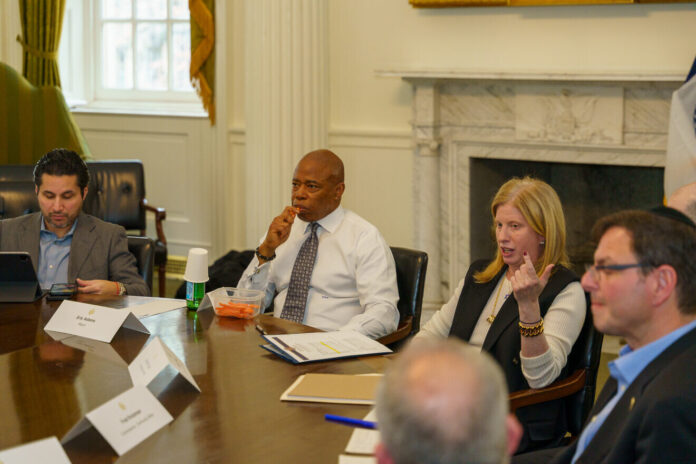|
Getting your Trinity Audio player ready...
|
(VITA FELLIG / JNS) — At a roundtable for Jewish reporters at City Hall on Dec. 19, New York City Mayor Eric Adams discussed his record on crime, including antisemitic hate crimes, and lauded the ways that he has elevated Jewish public servants in his administration.
“You can see yourself in my administration, in very significant places, not symbolic places, but very significant places,” he told the roughly two dozen Jewish journalists at the event. “But we’re also doing symbolism because I think symbolism is important. I think a mayor must be symbolic, and he must be substantive.”
As he munched on carrots during the meeting, the mayor told the Jewish press that “many people thought we couldn’t continue the celebration of the Israeli Independence Day Parade.”
“We did not run away from protecting our citizens. We didn’t,” he said. “It was one of the safest displays of Israeli independence, but also in your communities of what we’re doing every day.”



“This city has come back. People told us it was going to take five years. We did it in two years and really six months,” he said. “We are excited about the continued decrease in crime, almost 2% year after year. Our subway system is extremely safe. And this is a community where public safety, when I say public safety is a prerequisite to prosperity, this is a community that embraces that probably more than any other community in the city.”
Adams was joined at the meeting by three senior Jewish members of his staff: New York City Police Commissioner Jessica Tisch, New York City Fire Commissioner Robert Tucker and Fred Kreizman, commissioner of the mayor’s Community Affairs Unit. (Adams also mentioned Zach Iscol, commissioner of New York City Emergency Management, who is Jewish.)
The mayor told one Jewish reporter that there’s a need for “real balance to allow peaceful protests and violent protests.”
“Our legal team over at the New York City Police Department, the corp counsel, they make sure we don’t cross that line,” he said, per a City Hall official transcript. “Although there are many days we want to, when I hear people say, you know, ‘death to America,’ when I hear people [are] ‘wearing Hamas T-shirts, when I hear people spewing out hateful tongues, trust me, we wanna go in and just lock them up from doing that, but the law doesn’t allow us to do that.”
“Sometimes people say, ‘Why can’t you stop that?’ Because we can’t. There’s a trade-off of living in America, and we have to make sure we stay within the boundaries of what we can do,” the mayor said.
“But we push the envelope. When you start burning flares, when we tell you ‘you can’t go down a certain block,’ ‘you’re not gonna march in front of certain very important locations and communities,’ we take action if people violate that,” he added, per the transcript. “And then we were sure to allow people to move through the city without the attacks. NYPD made arrests whenever someone broke the law and formed an antisemitism from swastikas to assaults to harassment.”
‘Crown jewel’
Anti-Jewish hate crimes have risen 35% in New York City since Oct. 7, 2023, with 506 hate crimes reported this year compared with 374 reported crimes in 2023, according to Tisch, the police commissioner.
Michael Gerber, the deputy police commissioner, told the Jewish reporters that the department’s hate crimes unit is “really one of the jewels of the crown” of the NYPD. “We have lots of detectives, but it’s really an elite unit,” he said.
Asked if there is a problem of under-reporting of hate crimes, including antisemitic ones, Gerber said that “part of addressing that is outreach to a variety of communities, and that’s what we’re doing every day, both through our detectives and through community affairs.”
“It’s building those relationships and making people feel comfortable coming forward,” he said. “It’s always a work in progress.”
Rebecca Weiner, NYPD deputy commissioner of intelligence and counter-terrorism, told attendees that “There’s been such a climate, unfortunately of fear since Oct. 7,” but “if there’s any silver lining in a very dark year, it’s that we do feel that people are coming forward and letting us know, a lot more open and more understanding.”
Asked to reflect on the city’s approach to “pro-Palestinian” protests, Kreizman, of the community affairs unit, told reporters that under Adams’s direction, city staff have ensured “the working relationship with our stakeholders in the Muslim community to divert and ensure that these protests didn’t go into certain neighborhoods, as well as in front of certain institutions, like houses of worship.”
In so doing, Kreizman said, the city avoided “greater scale, greater conflict” and ensured “proper coordination together with the police department, obviously.”
JNS sought comment from the mayor’s office about what it means that city staff consulted with Muslim “stakeholders.” A city official told JNS on background that the community affairs unit’s Muslim liaison, at times, “would speak with pro-Palestinian protestors, who initially had plans to go into Jewish communities like Crown Heights on Shabbat, and work with them to re-route to areas that would be less provocative.”
Can’t ‘just police our way out of this’
“We’re seeing rising antisemitism in all segments, including in the African-American community,” a Jewish radio host said during the event. “As the mayor of New York and a respected African-American leader, what can we do to dampen antisemitism in the black community?”
Adams agreed with the premise of the question. “It’s clear when you look at the numbers,” he said. “Many of these cases are dealing with young people and young African Americans, boys specifically.”
“No. 1, we have to do a better job in our educational system, to really appreciate our diversity,” the mayor said. “No. 2, we need to be creative as adults.” He added that the city must “bring young people together, so they can sit in a room. A lot of hate is ignorance, and by allowing young people to come in and cross-pollinate their ideas and their cultures, I think that’s how we stop the increase.”
“We’re not going to be able to just police our way out of this,” he said, per the city transcript. “Because if you have hate being arrested, when you’re released, you’re going to still have that hate. So we have to educate our way out of this, and as adults, we need to invite our children into settings with other children. And then we have to take a strong stance.”
“I believe there should be a zero plea bargain rule when someone’s arrested for hate,” he added. “I think all of our district attorneys should be on the same page. That if you attack someone because of their race, religion, ethnicity, etc., there should be a zero plea bargain rule and people should be held accountable by the highest level of law.”
To emphasize his point about increasing cultural education, Adams shared an anecdote about being accosted in the street by a young, black Howard University student, who shouted at him for being a Zionist.
“While she was yelling at me, I was Googling one of the co-creators of Howard University, which is a very important school in the black community,” Adams told the Jewish reporters. “I just handed her my phone and she read it to learn that Julius Rosenwald was one of the co-founders of Howard University.”
“He also was the co-founder of Dillard College, another important historically black college and university, and co-founder of the NAACP,” he said. “So she sat there and read through it in amazement that that which she spewed and hated played a role for her to go to school and be educated.”
“That ignorance of the lack of connectivity between our culture and Jewish culture is something that we need to expose,” Adams said.




